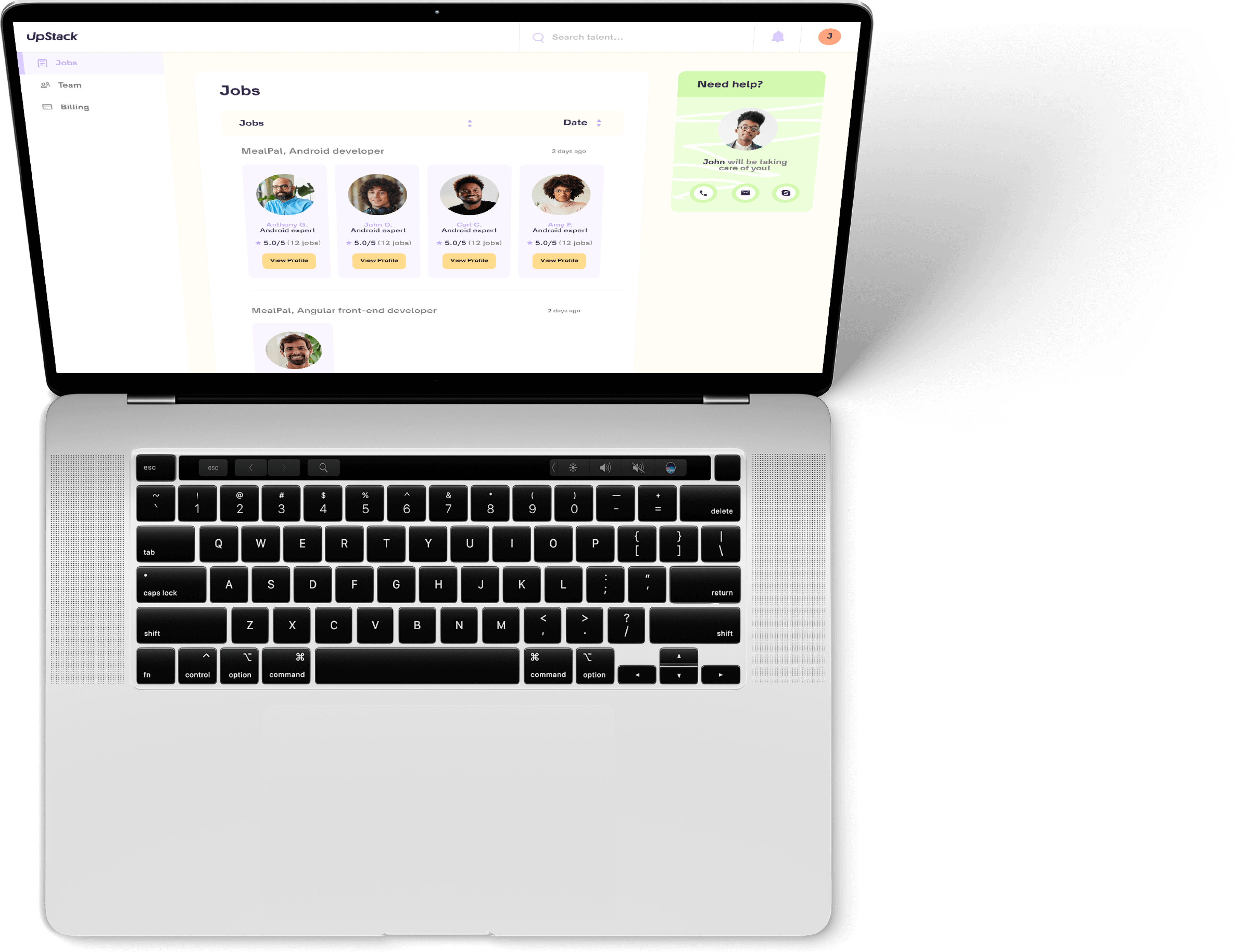


Hire Scala Developers Remotely {Devs Ready}
Stella B.
Available
Scala Developer
-
Experienced Scala engineer with seamless project implementation
-
Loves guacamole & hates spoilers

-
Marcus T.
Available
Scala Engineer
-
Stacked portfolio of beautiful, functional websites
-
Known for his epic charcuterie & cheese boards

-
David M.
Available
Mobile Developer
-
Mobile engineering guru with a knack for translating stakeholder needs
-
Would rather be diving Palau’s Blue Corner

-
Top Scala Developers with Upstack
Hire Scala Developers with Upstack
If you are looking to hire a Scala developer, you need to know what to look for. Are you looking for someone who has experience with functional programming, reactive programming, or distributed systems? Or do you want a programmer who is proficient in data manipulation and analysis? There is no one size fits all when it comes to hiring a Scala developer, so it is important to have a clear idea of what your needs are and how you can find someone who can fulfill them. With the right knowledge and tips, you can find the perfect Scala programmer for your project. This article will provide you with some tips and tricks to help you in your search for the right person for the job.
What is Scala?
Scala is a general-purpose programming language that is primarily used for distributed applications. It is a hybrid language that is part functional programming language (FP) and part object-oriented programming language (OOP). It is designed to be scalable and to run on a distributed environment. It is also statically typed and compiled, which makes it a lot more predictable that many other languages. It is designed to be used in a wide variety of use cases, such as web services, artificial intelligence, and data science. Some of the most common uses of Scala include building web services and software for distributed systems, creating complex mathematical algorithms, and using it for data manipulation and analysis. A lot of companies use Scala for their backend systems because it is a language that is scalable and can run on a distributed environment. Therefore, if your company is looking to start using distributed systems, then you would want to use a programming language that is distributed. Furthermore, if you are using distributed systems in your system, you would also want to consider using a functional programming language because functional programming is designed for distributed systems.
Qualifications to Look for When Hiring a Scala Programmer
Before you start looking for applicants, it is helpful to have a list of qualifications so that you can clearly define what you are looking for in the perfect Scala developer. It is important to have a clear idea of what your project needs and what your hiring needs are before beginning the hiring process. With the right qualifications, you can find the perfect candidate for your team. Here are some qualifications to look for when hiring a Scala programmer. - Is the programmer experienced in distributed systems? If so, they should be able to use Scala on a distributed environment. - Does the programmer have experience in functional programming? If so, they should be able to use the functional programming concepts and syntax in their code. - Does the programmer have experience in writing concurrent code? If so, they should understand the challenges of writing complex concurrent code and the different ways to tackle these challenges. - Does the programmer have experience in writing code for big data systems? If so, they should be able to understand the challenges of dealing with big data and the ways to efficiently handle it. - Does the programmer have experience in data science? If so, they should be able to use complex data manipulation and analysis techniques.
Essential Skills for a Scala Developer
- Scalability – The ability to run on a distributed environment is key for a Scala programmer. You want to make sure that the developer you hire understands how to scale their code and be able to incorporate it into your current system. - Data Science – This is a skill that many developers specialize in. It is important to make sure that the developer you hire is proficient in data manipulation and analysis. - Concurrency – Writing concurrent code is a very challenging task and requires a high level of proficiency and experience. You want to make sure that the developer you hire is well versed in writing concurrent code. - Mathematical Algorithms – Scala is often used for mathematical algorithms, so it is important to hire a developer who is proficient in writing mathematical algorithms. It is important to make sure that the developer you hire is proficient in these areas so that they can successfully complete your project.
Understanding the Different Areas of Scala
One thing to keep in mind when hiring a Scala developer is that the language is complex and has many different areas and uses. If you are hiring a Scala developer, you need to make sure that they have experience in the areas of Scala that you will be using. Here are some areas of Scala that you need to be familiar with when hiring a Scala developer. - Standard Scala – This is the most common and standard implementation of Scala that you will find. It is the language as written in the book. - Functional Scala – This is a version of Scala that is purely functional with no side effects. This means that it does not have any state and does not modify any data. - Scala on the JVM – This is a version of Scala that runs on the JVM. It is the version of Scala that most developers use and is the version that you should hire a developer for if hiring for a standard implementation. - Scala.NET – This is a version of Scala that runs on the .NET framework.
Interviewing a Scala Developer
When it comes time to interview a Scala programmer, it is important to have a list of questions prepared so that you can get a clear picture of the candidate’s strengths and weaknesses. You want to make sure that the person you hire is a good fit for the job and can be successful in the position. Here are some questions you can ask a Scala developer during the interview process. - What are the benefits of using Scala? What are some challenges that come with using Scala? - What are the differences between standard and functional Scala? - What is the difference between Scala on the JVM and Scala.NET? - What are some uses of Scala? - What is an example of a complex application written in Scala, and how would you scale it? - What are some applications that use Scala? - If a company wanted to use Scala, what are some of the challenges they would face? - What skills are needed to be successful as a Scala programmer?
Questions to Ask a Scala Programmer
Once you have narrowed down your options and spoken with some Scala developers, it is important to ask them some questions to see how well they fit the job description and if they are the right person for the job. Here are some questions you can ask a Scala programmer during the interview process. - What languages do you currently use and for what applications or projects? - What kind of experience do you have with distributed systems and how do you approach them? - What are some challenges that you have run into when working with distributed systems? - What are some applications that you have built for distributed systems? - How would you approach optimizing a large-scale application? - How would you approach testing a complex application? - What are some examples of complex systems you have used Scala for? - What are some challenges that you have faced while working on these systems? - What is your approach to incorporating Scala into an existing system? - How would you handle working with legacy systems?
The Benefits and Challenges of Hiring a Scala Developer
Hiring a Scala programmer is a great decision because Scala is a scalable, powerful, and flexible language that is easy to use. It is a practical and efficient choice for many applications. Although it can be a great choice for your business, it is also a very challenging language to hire for. It can be a very difficult language to learn and master, which can make it difficult for developers to be proficient in it. Therefore, hiring a Scala developer can be beneficial for your company, but it can also be challenging because it can be difficult to find someone who is qualified. It is important to make sure that you are up front with your requirements and know exactly what you are looking for in the perfect candidate. It will make the hiring process much easier and help you find the right person for the job.
How to Retain a Scala Programmer
Once you have hired a Scala developer, it is important to keep them on your team. One way to do this is by making sure that they feel appreciated and valued. Another way is to make sure that they have the right tools and resources to do their job. In order to retain a Scala developer, you need to make sure that they have what they need to be successful and happy in the position. When you are hiring a Scala programmer, it is important to make sure they have the right qualifications and are a good fit for the position. It is also important to make sure they have everything they need to do their job well.
They trust Our Scala Developers
Why hire a Scala developer with Upstack
![Scala Developer and Programmer]()
Top Scala talent pre-vetted for a perfect fit.
Our 8-point assessment evaluation ensures that every senior Scala developer you interview exceeds expectations across technical, cultural, and language criteria.
![Scala Programmers Computer Icon]()
Hire reliable, passionate Scala developers.
From late-night sprints to jumping on a last-minute face-to-face, we ensure that your recruits are down to get the job done right.
![Scala Programmers High Five Icon]()
Risk-free 14-day trial.
Confidently onboard candidates with our no-questions-asked trial period. We’ll walk you through the contract-to-hire process if and when you’re ready to make it permanent with your new Scala engineer.
![Scala Computer Programmer Icon]()
Our Client Success Experts provide white-glove service.
Stay laser-focused on your business goals while our team of experts curates potential candidates and manages seamless programmer onboarding.
![Scala Developer Writing Notes Icon]()
Build your optimal team confidently, quickly.
UpStack handles everything including background and reference checks, legal issues, and more. Our platform streamlines billing, timesheets, and payment all in one easy-to-access place.
Schedule a call with a Client Success Expert to get starting hiring a Scala developer.
Start hiring Start hiring Start hiring
Hire from the Best.
Working with our Client Success Experts, we’ll help you build the remote team of your dreams with top Scala talent from around the world.
Pre-vetted, reliable Scala developers are standing by.





Hiring Scala Developers | FAQs
How much does it cost to hire a Scala developer?
UpStack has a simple billing model where each Scala developer has a standard hourly rate averaging between $65-$75 per hour. Rates are based on skills, knowledge, and experience, and our developers are available mainly for full-time engagement (40 hours per week) and the occasional part-time opportunity (20 hours per week).
What is the process to find a Scala developer?
You’ll connect with an UpStack Client Success Manager to determine your immediate needs. Our team uses a combination of AI and personal assessment to short-list candidates that match your job requirements. From there, you interview, select, and onboard the perfect developer, all within days of your initial call.
How does UpStack find its Scala developers?
UpStack’s talent recruitment team connects with software developers around the globe every day. Each Scala programmer is vetted for technical, communication, and other soft skills necessary for a developer to successfully work with your team. Once vetted, the candidates are accepted into the UpStack developer community.
How is UpStack different from an agency or recruiter?
UpStack's community of available, pre-vetted engineering talent means minimizing roadblocks to scaling your team effectively, efficiently, and immediately. Our Client Success Experts work with you and your UpStack developer to ensure a smooth and seamless engagement.
Can I hire UpStack Scala developers directly?
Yes, you can hire UpStack Scala developers at any time, and with the same assurance of smoothly on boarding talent risk-free. First, we’d create a job opening on our portal. Then, we’d vet, interview, and match developers that meet your needs. If you’re satisfied at the end of the 14-day trial period, at any time you can directly hire them.
Common Scala FAQs
What is Scala?
Scala is a programming language that was designed to be concise, expressive, and scalable. It is a general-purpose language that is used for a wide range of applications, including data analysis, machine learning, and web development. Scala is a statically-typed language, which means that the type of a variable must be specified at compile time. This can help catch errors early in the development process, and also allows the compiler to optimize code more effectively. Scala also supports functional programming, which means that it is possible to write code in a style that is based on mathematical functions. One of the main benefits of Scala is that it runs on the Java Virtual Machine (JVM), which means that it can be used to write code that is interoperable with Java. This makes it easy to incorporate Scala into existing Java projects, or to use libraries and frameworks that have been written in Java. Scala is a powerful and flexible language that is well-suited for building large, complex systems. It is used by companies such as Twitter, Netflix, and LinkedIn to build high-performance, scalable applications.
What is better Python or Scala?
It is difficult to say definitively whether one programming language is better than another, as the choice of which language to use depends on a variety of factors. Both Python and Scala are popular and widely-used languages, and they each have their own strengths and weaknesses. Python is a popular language for data science and machine learning, and it has a large and active community of users. It is known for its simplicity and readability, which makes it a good choice for beginners. Python also has a large standard library and a wide range of third-party libraries and frameworks that make it easy to build applications.
Scala is a general-purpose programming language that is well-suited for building large, complex systems. It is a statically-typed language, which can help catch errors early in the development process and allow the compiler to optimize code more effectively. Scala also supports functional programming, which can make it easier to write code that is concise and expressive. In general, Python may be a good choice if you are just starting out as a programmer, or if you need to build a simple application quickly. Scala may be a better choice if you are building a large, complex system, or if you need to write code that is highly performant. Ultimately, the choice between Python and Scala depends on your specific needs and goals.
Does Netflix use Scala?
Yes, Netflix uses Scala as one of its primary programming languages. In fact, Scala was one of the first languages that Netflix adopted when it transitioned from a monolithic architecture to a microservices architecture. Scala's ability to support concurrent and distributed systems, as well as its compatibility with the Java Virtual Machine (JVM), make it well-suited for building the kind of high-performance, scalable applications that Netflix requires. Additionally, Scala's support for functional programming allows Netflix engineers to write code that is concise, expressive, and easy to maintain. Netflix has also developed a number of tools and libraries that are built on top of Scala, including the Simian Army (a set of tools for testing the resiliency of Netflix's infrastructure) and the Netflix Conductor (a workflow orchestration engine). These tools have helped Netflix maintain its position as a leader in the field of online streaming.
What is replacing Scala?
It is difficult to predict exactly what will replace Scala in the future, as the popularity of programming languages can vary over time. That being said, Scala is a powerful and widely-used language that has a strong following among developers, and it is likely to remain a popular choice for building large, complex systems for the foreseeable future. That being said, it is always important for developers to stay up-to-date with the latest technologies and trends in the field. Some programming languages that have gained popularity in recent years and may be used as alternatives to Scala in certain contexts include Kotlin, Rust, and Go. Ultimately, the choice of which programming language to use depends on the specific needs and goals of a project. Developers should consider factors such as the language's performance, scalability, readability, and the availability of libraries and frameworks when deciding which language is the best fit for a given project.















